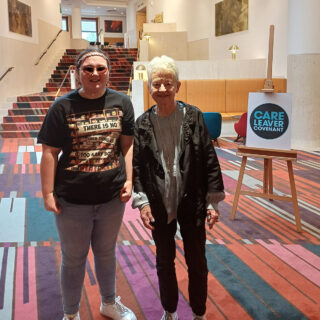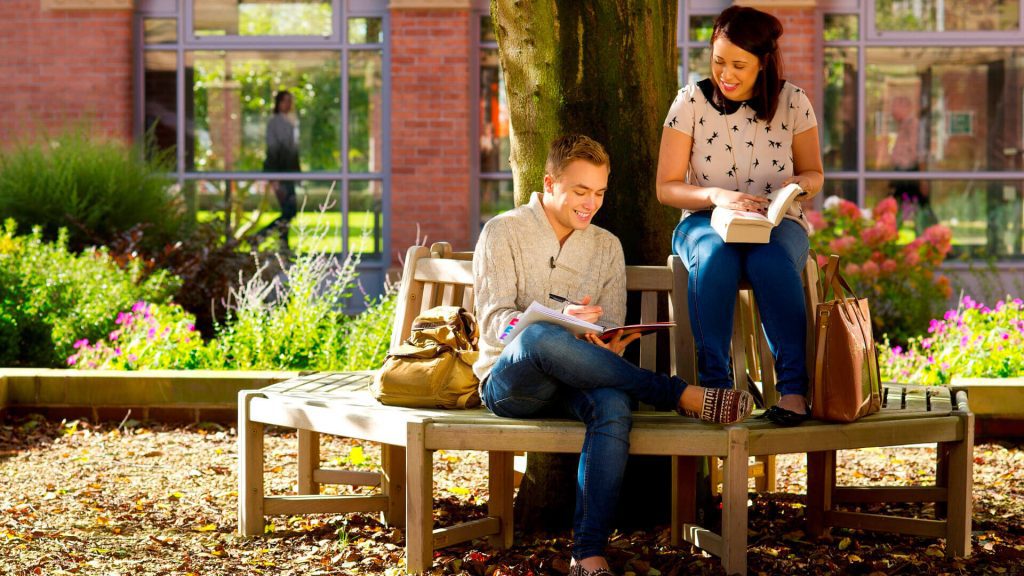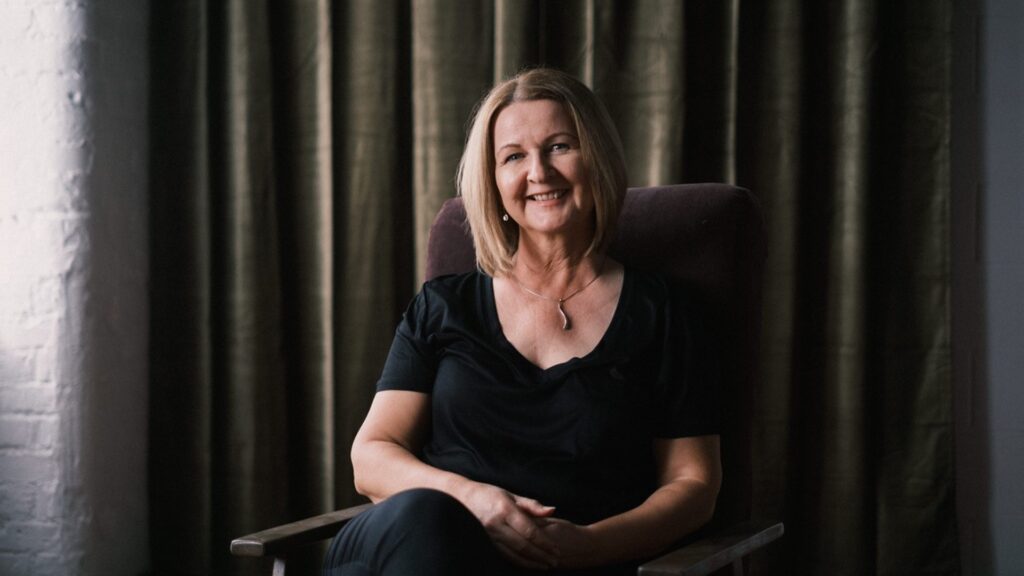Creative Writing BA (Hons)
UCAS code: W800
Push your creative limits. Build your literary skills. Join practice-led workshops and readings with contemporary writers. Make connections as publishing and broadcasting professionals share insights. Find your voice with a creative writing degree that fires your imagination.
Overview
| Course length: | 3 years full-time 6 years part-time |
|---|---|
| Start dates: | September 2024 September 2025 |
| Location: | Edge Hill University |
| Example offers: | BBC-BBB (A Level) or DMM (BTEC) View full entry criteria |
| Subject(s): | Creative Writing |
| Faculty: | Arts and Sciences |
| Department: | English and Creative Arts |

As a writer, you are an artist and a craftsperson. Our creative writing degree gives you the tools and skills you need to grow into the best writer you can be.
During the course, you experiment with different kinds of writing. You’ll create original poetry, fiction, and non-fiction. We’ll help send your imagination soaring in writing scripts and narratives for stage, screen and games.
We encourage you to challenge yourself. You’ll learn to analyse and edit your own work to make your writing better: an ability every good writer must develop.
We are proud of our supportive Edge Hill writing community. It has helped students like you achieve their potential for over 30 years. Our teaching team consists entirely of published writers, so understand what it takes to launch a writing career. Our visiting professionals – writers, producers, editors, poets, dramatists – love to share their knowledge. We all work together so you can succeed.
Course features
-
International students can apply
-
Learn a language option available
-
Sandwich year option available
-
Studying abroad option available
What you'll study
Your writing journey begins by exploring key ideas in poetry, fiction, writing for games, and script writing. We encourage you to start a writer’s journal as you develop the foundations of your writing ability. You’ll develop skills in constructing your own fictional worlds and learn to read as a writer. Year 1 also introduces the business of writing, and the art of leading a writer’s life.
In Year 2 the emphasis is on developing a professional approach to your writing. Write contemporary poetry, short fiction and a one-act play, then analyse and edit your work to make it better. Find out about opportunities in publishing. Gain a greater understanding of professional creative writing and the writer’s life by taking a placement, or creating a culturally relevant piece of group work. Your growth in confidence and experience will set you up for greater creative freedom in Year 3.
Develop confidence as an autonomous writer. You’ll create a substantial project in your chosen medium, whether it be poetry, non-fiction, short story, the start of a novel, a script for the stage, screen, radio or graphic novel, or an immersive games narrative. You also have four optional modules to develop your skills in a particular area like fiction, screenwriting or digital adventure games. Or choose to throw yourself into experimental creative practice and analyse contemporary writers’ work.
Optional modules provide an element of choice within the course curriculum. The availability of optional modules may vary from year to year and will be subject to minimum student numbers being achieved. This means that the availability of specific optional modules cannot be guaranteed. Optional module selection may also be affected by timetabling requirements. Some restrictions on optional module choice or combinations of optional modules may apply. In addition to the optional module choices listed, it may also be possible to apply to study an alternative 20-credit module in Year 2 and/or Year 3, chosen from outside the course curriculum. Some restrictions on this elective module choice may apply.
How you'll study
Teaching and learning is centred on the writer’s workshop, where your writing will improve through practical exercises and the analysis of existing work. The workshop is a vital element in your development as a writer and your participation through self and peer appraisal will provide opportunities for improving your work and commenting constructively on that of fellow writers.
Working individually, in pairs and in larger groups, you will analyse your own and other writers’ creative practice. You will learn the habits and methods of a professional writer through activities such as keeping a writer’s journal, research and observation, re-drafting and editing, and presenting work to a high standard.
There are also opportunities to undertake work-based learning through independent and employability-focused projects. Past projects have included setting up and running an online literary magazine, writing and producing a play, and developing and delivering a series of creative writing workshops in schools.
How you'll be assessed
All modules are assessed by coursework, which includes creative practice, critical practice, essays, presentations, and a reflection on the creative process.
There are no formal written examinations as part of the current assessment methods on this degree.
Who will be teaching you
You’ll be taught by tutors who are practising professional writers. They include published short story writers, poets, dramatists and games writers. The programme team are also active researchers and scholars, publishing work in a variety of academic and literary journals. This means that you’ll be taught by people who know how to succeed in both the creative industries and academia.
As a Creative Writing student at Edge Hill University, you’ll also have the opportunity to attend workshops and readings with a variety of guest writers at the Arts Centre. Close links have also been established with Liverpool’s Everyman Theatre, as well as other live venues across Merseyside.
Entry criteria
Entry requirements
Typical offer 112-120 UCAS Tariff points. No specific subjects are required but the study or experience of English Language, English Literature, Drama or Media would be preferred.
You will be asked to submit a sample of your writing.
Example offers
| Qualification | Requirement |
|---|---|
| A Level | BBC-BBB. |
| BTEC Extended Diploma (or combination of BTEC QCF qualifications) | Distinction, Merit, Merit (DMM). |
| T Level | Overall grade of Merit. |
| International Baccalaureate (IB) | We are happy to accept IB qualifications which achieve the required number of UCAS Tariff points. Subject-specific requirements at Higher Level (HL) Grade 5 may apply. |
| Access to Higher Education Diploma | 45 credits at Level 3, for example 15 credits at Distinction and 30 credits at Merit or 24 credits at Distinction and 21 credits at Merit. The required total can be attained from various credit combinations. |
Please note, the above examples may differ from actual offers made. A combination of A Level and BTEC awards may also be accepted.
If you have a minimum of two A Levels (or equivalent), there is no maximum number of qualifications that we will accept UCAS points from. This includes additional qualifications such as Extended Project Qualification (EPQ), AS Levels that haven't been continued to A Level, and General Studies AS or A Level awards.
English language requirements
International students require IELTS 6.0, with a score no lower than 5.5 in each individual component, or an equivalent English language qualification.
If your current level of English is half a band, one band, or one-and-a-half bands lower, either overall or in one or two elements, you may want to consider our Pre-Sessional English course.
How to apply
Apply full-time
Read our guide to applying through UCAS to find out more about the application process.
International
Please see our international student pages for further information about how to apply as a prospective international student.
Part-time applications require a direct application to Edge Hill. Please select the year of entry that you wish to apply for.
Should you accept an offer of a place to study with us and formally enrol as a student, you will be subject to the provisions of the regulations, rules, codes, conditions and policies which apply to our students. These are available at www.edgehill.ac.uk/studentterms.
If you join a full time undergraduate degree at Edge Hill University, we will guarantee you the offer of a room in our halls of residence for the first year of your course.
Discover our accommodation
Facilities
 The Department of English and Creative Arts is based in Creative Edge, a state-of-the-art £17million building offering highly contemporary facilities.
The Department of English and Creative Arts is based in Creative Edge, a state-of-the-art £17million building offering highly contemporary facilities.
The £17 million Creative Edge building features a lecture theatre, seminar rooms, IT facilities and smaller tutorial spaces. It has everything you need to become a capable, versatile, creative writer and thinker. Creative Edge’s social learning spaces are ideal for passionate discussion with like-minded creatives.
You’ll develop the practical skills, analytical tools and confidence for wherever your creative flair and insight takes you.
Where you'll study
Creative Edge
Finance
Tuition fees
UK Full-Time
£9,250
a year
UK Part-Time
£77 per credit
for 360 credits
International
£16,500
a year
EU/EEA and Swiss students who have settled or pre-settled status under the EU Settlement Scheme, as well as Irish nationals, may be eligible for the UK tuition fee rate.
Financial support
Subject to eligibility, UK students joining this course can apply for a Tuition Fee Loan from the Government to cover the full cost of tuition fees. UK students enrolling on the course may also be eligible to apply for additional maintenance loan funding to help with living costs. Please view the relevant Money Matters guide for comprehensive information about the financial support available to eligible UK students, together with details of how to apply for potential funding.
EU/EEA and Swiss students who have settled or pre-settled status under the EU Settlement Scheme may be eligible to apply for financial support. Irish nationals can ordinarily apply to Student Universal Support Ireland (SUSI). If you are an EU student who does not have settled or pre-settled status, or are an international student from a non-EU country, please see our international student finance pages.
Your future career
What can you do with a BA (Hons) Creative Writing? Some graduates launch freelance writing careers. Others find jobs in publishing, content creation, game design and teaching. Here are some names you might know:
- Oxford University Press
- Dead Ink Books
- Crooked Dice
- DC Thomson Media
- Southport College
- NHS Leadership Academy
- War Games Illustrated
- Superdry
Your future and employability matter to us. Our dedicated Placement Officer can help you find industry opportunities to add to your CV.
We also have an exciting games company partnership. Crooked Dice offer internships to our students, who form a team to design, market and launch a tabletop roleplay game. Students have launched successful freelance games industry careers this way.
As well as sharing external opportunities, we offer a range of scholarships, including the Dame Janet Suzman Playwriting Award. This is open to 3rd years and MA students, like Hywel Wilkie who won in 2018 and went on to become a Liverpool Everyman Young Writer.
The creative writing team also run The Edge Hill Press, where students can intern on real-world publications, partnering with publishers like Pluto Press and Galley Beggar. The Edge Hill Prize is one of the biggest literary prizes in the UK, with opportunities for students to intern or become part of the reading panel.
Course changes
Every effort has been made to ensure the accuracy of this information, however our courses are subject to ongoing review and development. Changing circumstances may necessitate alteration to, or the cancellation of, courses.
Changes may be necessary to comply with the requirements of professional bodies, revisions to subject benchmarks statements, to keep courses updated and contemporary, or as a result of student feedback. We reserve the right to make variations if we consider such action to be necessary or in the best interests of students.












